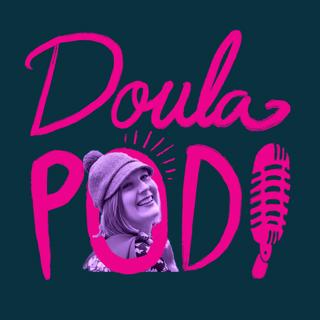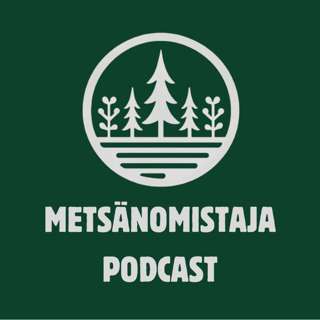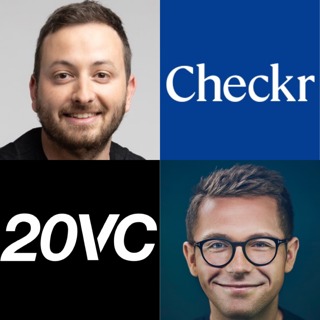
20VC: Hiring 101; The Biggest Mistakes Founders Make in the Hiring Process | Fundraising; What to Optimize for, How Profitability Changes Leverage When Raising | SMB to Enterprise; When to Move, What Changes and Dangers of Moving Too Early with Daniel Yan
Daniel Yanisse is the co-founder and CEO of Checkr, a leading HR technology company, currently valued at $5 billion. During the journey, Daniel has raised over $679M for Checkr from some of the best including Accel, Bond, Coatue, GV, Elad Gil and IVP to name a few. Prior to Checkr, Daniel was a software engineer and helped develop prototypes of the Mars Rover for NASA. Daniel has been recognized in Forbes "30 Under 30" and recently Checkr was recognized by Forbes as one of America's best start-up employers. In Today's Episode with Daniel Yanisse You Will Learn: 1.) The Origins of Checkr: The $5BN Company How did Daniel come to co-found Checkr? What was the a-ha moment? How did Daniel's experience with his prior company impact how he thought about building Checkr? What does Daniel know now that he wishes all first-time founders knew when they started? 2.) Hiring 101: What are the single biggest hiring mistakes Daniel made in the early days of Checkr? How does Daniel structure his interview process for new candidates today? How has it changed? How does Daniel test for ego and humility in the interview process? How does Daniel approach giving feedback today? How has it changed over time? What does Daniel believe is the right way to let someone go? How long does one give a team member who is not performing? 3.) Fundraising 101: How does Daniel advise founders going out to raise today in the challenging market conditions? What terms should founders optimize for? What terms should they not optimize for? What are the single biggest mistakes Daniel sees founders make when raising? What does Daniel wish he had done differently with Checkr's raises? What was the hardest raise for Checkr? Why was it so hard? What was the outcome? 4.) Going into Enterprise: Why does Daniel believe they went into enterprise too soon? What was the result of this? How does Daniel advise founders on when is the right time to go into enterprise? What changes in both your company and your product when moving to enterprise? Items Mentioned in Today's Episode with Daniel Yanisse: Daniel's Favourite Book: Accelerate: The Science of Lean Software and Devops: Building and Scaling High Performing Technology Organizations
1 Heinä 202239min
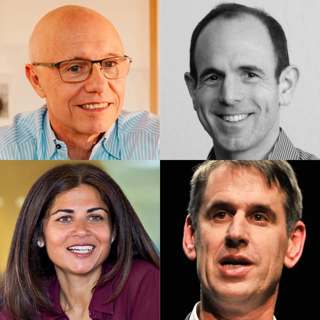
20VC: The Memo: Bill Gurley, Doug Leone, Keith Rabois; Investing Lessons from Prior Busts, How Their Investor Psychology Changed, What Can Be Applied To Today's Market
Bill Gurley is a General Partner @ Benchmark Capital, Bill, is widely recognized as one of the greats of our time having worked with the likes of GrubHub, NextDoor, Uber, OpenTable, Stitch Fix, and Zillow. Doug Leone is the Global Managing Partner @ Sequoia Capital, one of the world's most renowned and successful venture firms with a portfolio including the likes of Google, Airbnb, Whatsapp, Stripe, Zoom and many more. Keith Rabois is a General Partner @ Founders Fund, one of the best performing funds of the last decade with a portfolio including Facebook, Airbnb, SpaceX, Stripe, Anduril, the list goes on. Arthur Patterson and Jim Swartz founded Accel in 1983. Under their leadership, they have built Accel into one of the most prominent venture firms of the last 4 decades. Michael Eisenberg is a Co-Founder and Equal Partner @ Aleph, with a portfolio including the likes of Lemonade, Melio and HoneyBook, they are one of the leading early-stage firms of the last decade. Sonali De Rycker is a Partner @ Accel, one of the leading firms of the last 3 decades with a portfolio that includes the likes of UiPath, Miro, Spotify and many more incredible companies. Fabrice Grinda is the Founding Partner @ FJ Labs, with over 700 investments, Fabrice has had over 250 exits and built a portfolio including Alibaba, Coupang, Airbnb, Instacart, Flexport, and many more. In Today's Episode You Will Learn: 1.) How does the current environment compare to prior busts? 2.) How will the changing interest rates impact the startup funding climate moving forward? 3.) Why is the rate of inflation the only true metric which reveals the ultimate fate of the economy? 4.) What are the world's leading investors telling their founders? 5.) How are the best investors in the world thinking through reserves management?
29 Kesä 202226min
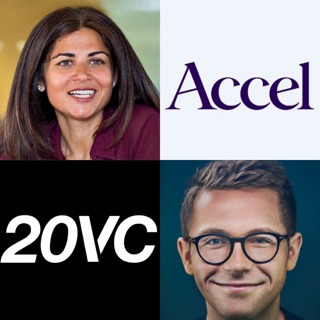
20VC: Accel's Sonali De Rycker on Building a Generational Defining Venture Firm; Hiring, Culture, Incentives | Investing; Biggest Mistakes, Biggest Lessons from Prior Crashes, Why Market Size is Dangerous to Focus On | Decision-Making; Type 1 vs Type 2 Ri
Sonali De Rycker is a Partner @ Accel, one of the leading firms of the last 3 decades with a portfolio that includes the likes of UiPath, Miro, Spotify, and many more incredible companies. As for Sonali, Sonali led Accel's investments in Avito (acquired by Naspers), Spotify (NYSE: SPOT), Primer, Monzo, Letgo (acquired by Naspers), Kry/Livi, Soldo, Hopin, and Sennder. Prior to Accel, Sonali was with Atlas Venture (now Accomplice). She also previously served on the board of Match.com (NASDAQ:MTCH). In Today's Episode with Sonali De Rycker You Will Learn: 1.) From Small Town in India To Leading Venture Capitalist: How Sonali made her way from a small town in India to becoming one of the most prominent VCs of the last decade? What were some of Sonali's biggest lessons from seeing the booms and busts of 2000 and 2008? What climate does the crash today resemble more? Why so? How does Sonali advise younger investors who have not lived through a downturn? What should their investor psychology be right now? 2.) Firm Building: Accel: What are the most challenging and non-obvious elements of building a firm today? What have been some of the biggest mistakes Accel has made when adding to the team? What qualities do Sonali and Accel specifically look for when interviewing candidates to join the team? What specific questions tease out whether the candidate has these traits? What specific structures does Accel have in place to encourage the team to work together as one cohesive unit? How do they use bonuses as a team incentive? 3.) Sonali: The Investor: How has Sonali's investing style changed over the years? What moments caused these changes to happen? What are some of the biggest mistakes Sonali has made in her investing career? What did she learn from them? On the flip side, from winners such as Spotify and Supercell, what did Sonali learn from her biggest winners? Why does Sonali believe that market sizing and outcome scenario planning is useless and will lead you to make the wrong decision? 4.) Decision-Making and Risk: What does Sonali mean when she speaks of Type 1 and Type 2 decisions? How should one's decision-making process change according to which type of decision it is? What are the two biggest risks startups are facing today? Does Sonali believe that seed-stage companies will take money from crossover funds? What does Sonali do when she loses faith in the founder? How does she communicate that to them in the right way? What have been some of her biggest lessons here? What have been some of Sonali's biggest lessons when it comes to reserves management? How does Sonali determine when to double down vs reserve cash? Items Mentioned in Today's Episode with Sonali De Rycker: Sonali's Favourite Book: A Fine Balance Sonali's Most Recent Investment: BeReal
27 Kesä 202248min
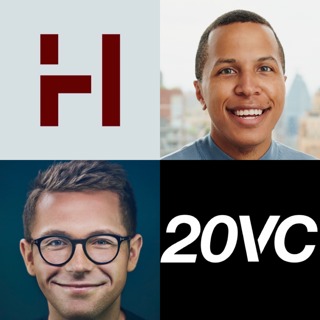
20VC: From Kitchen Table to $134M Fund II; Raising Your First Time Fund: Lessons from 400 LP Meetings, How To Find New LPs, What Materials to Use, How To Get LPs To Commit, The Challenges on Minimum Check Sizes and GP Commits and more with Henri Pierre-Ja
Henri Pierre-Jacques is Managing Partner of Harlem Capital, on a mission to change the face of entrepreneurship by investing in 1,000 diverse founders over the next 20 years. From a kitchen table with his Co-Founder, Jarrid, Henri has scaled Harlem in just a few years to their latest fund last year of $134M, well over-subscribed from their $100M target. Prior to Harlem, Henri was in Private Equity at ICV Partners, and before PE was an Investment Banker at Bank of America Merrill Lynch. In Today's Episode with Henri Pierre-Jacques 1.) From Kitchen Table to $134M Fund: How did Henri make his way into venture having had the idea for Harlem at the kitchen table with his best friend? How did Henri use his angel investing strategically to position him to raise Fund I? How did Henri's mindset change when making the transition from angel to VC? 2.) The First Fundraise: Harlem I How long did it take to raise the first fund? How many meetings did they have? What were the most common reasons LPs said no for the first fund? What were their biggest lessons around what potential LPs did and did not like? How does Henri advise new managers when it comes to meeting new LPs? How does Henri use past deal memos to serve as discussion material with LPs? 3.) Building the Firm: The Strategy: What was the portfolio construction for the first fund? How does Henri separate the world of funds into 3 distinct groups? How did they approach reserves management with the first funds? What are some of Henri's biggest lessons when it comes to effective reserves management? How does Henri assess his own relationship to price and ownership? How does that change with fund size? What are some very important nuances that Henri does not believe many managers think about? 4.) It Is Time For Change: Specifically, what are Harlem street doing to ensure the next generation of investors is much more diverse? How do they leverage their intern program to achieve this? What would Henri like to see change in the world of LPs when it comes to allocating to more diverse managers? What legacy does Henri want to leave with Harlem? What will be a success for Henri? Items Mentioned in Today's Episode with Henri Pierre-Jacques: Henri's Most Recent Investment: Mueshi
24 Kesä 202244min
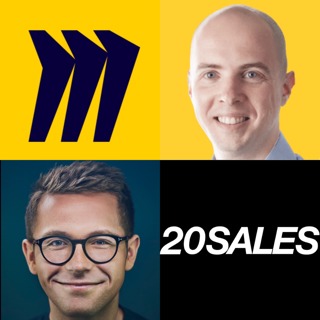
20 Sales: Why Founders Should Not Be The One To Create The Sales Playbook, How To Structure Each Interview in the Hiring Process For Sales Reps, How To Use an "Interview Panel" Effectively and more with Zhenya Loginov, CRO @ Miro
Zhenya Loginov is the CRO @ Miro, the leading visual collaboration platform that helps bring teams together and meaningfully improves the way people work. At Miro, I run the go-to-market team of 700+ people across 11 global offices. Prior to Miro, Zhenya was the COO @ Segment where he built and ran the global go-to-market team of 200+ people, expanded the product-market fit into the Enterprise and grew revenue 6x, leading to their acquisition by Twilio for $3.2Bn. Finally, before Segment, Zhenya led a 100-person team at Dropbox across numerous different functional areas. In Today's Episode with Zhenya Loginov You Will Learn: 1.) Entry into Sales as an Outsider: How Zhenya made his way into sales as an outsider and came to be one of the most powerful revenue leaders today with Miro? What are 1-2 of the biggest takeaways for Zhenya from his time at Segment and Dropbox? How did they impact his mindset today? Why did Dropbox not win the enterprise when they had the chance? What mistakes did they make? 2.) The Sales Playbook: What, Why and How: What does "the sales playbook mean to Zhenya? Does the founder need to be the one to create the sales playbook? What are the signs that the founders needs to bring in their first sales hire? Should this sales hire be a sales leader or more junior sales rep? Is is possible to run a PLG and enterprise sales motion at the same time in the early days of the company? What do many founders misunderstand when contemplating adopting an enterprise sales strategy? 3.) Hiring the Team: How does Zhenya structure the interview process for new sales hires? Zhenya spends 5 hours with each candidate, what does he look to get out of each meeting? How does Zhenya break down the criteria for what he wants to see? What are some examples of this? How does Zhenya test to determine if the candidate has these criteria? What questions does he find to be most revealing? Why does Zhenya find case studies to not be useful? How does Zhenya use interview panels to ensure he makes the right hiring decision? Who is on the panel? At what stage do they meet the candidate? How does Zhenya like to use the panel? 4.) Laying the Groundwork: The Onboarding Process: What is the right way to structure the onboarding process for all new sales hires? What are some early signs that a new sales hire is not working? What can sales leaders do to ensure new reps get "early wins" on the board? What can leadership do to ensure the sales team has good cross-functional communication across the org? What works? What does not work? What are some of the biggest challenges of running a remote sales team?
22 Kesä 202248min
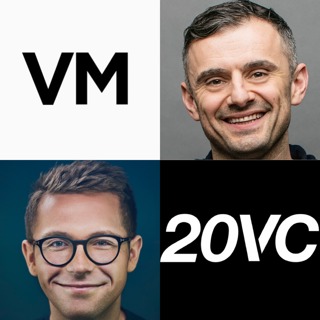
20VC: Gary Vaynerchuk on The Most Painful Lessons Learned but Why it was Good to Learn Them, Why You Have to Change the Timeframe You Have For Success, His Relationship to Money and How it Has Changed Over Time & His First 3 Angel Investments; Twitter, Fa
Gary Vaynerchuk is a serial entrepreneur and serves as the Chairman of VaynerX, the CEO of VaynerMedia and the Creator & CEO of VeeFriends. Now Gary is a content machine and documents his life as a CEO daily through his social media channels which have more than 34 million followers and garnishes over 272 million monthly impressions/views across all platforms. He is also a five-time New York Times Best-Selling Author and is a prolific angel investor with early investments in companies such as Facebook, Twitter, Tumblr, Venmo, Snapchat, Coinbase and Uber. If this was not enough, Gary serves on the board of GymShark, MikMak, Bojangles Restaurants, and Pencils of Promise. In Today's Episode with Gary Vaynerchuk We Discuss: 1.) From Wine Library to One of The Great Angels in Tech: How did Gary make the transition from scaling the wine library to $60M in revenue to angel investing in Twitter, Facebook and Tumblr? To what extent does Gary think luck plays a role in one's success today? What are Gary's biggest lessons from having FB, Twitter and Tumblr as his first investments? How has his style of angel investing changed over time? 2.) Hard Lessons Learned and Insecurity: What is the most painful lesson Gary has learned that he is also pleased to have learned? How did Gary's relationship with his father impact how he engages with his children as a father today? What are Gary's biggest insecurities today? How does he try and combat them? What works? 3.) Money and Success: How does Gary evaluate his relationship with money today? How has it changed over time? Why does Gary believe that most people think too short-term? What can one do to inspire a more long-term mindset to building? Does Gary believe that everything has a price? What is the one thing for Gary that does not have a price? 4.) Resource and Time Allocation: How does Gary determine the projects to do vs not to do? How does Gary know when to quit a new project? How does Gary advise founders on when something is not working and knowing when to quit? What are some of the biggest mistakes Gary sees founders make when it comes to resource allocation in the early days?
20 Kesä 202230min
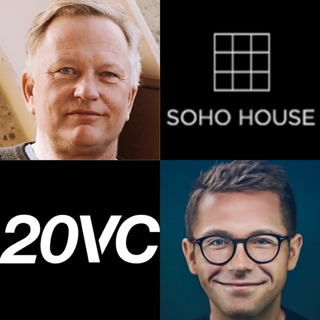
20VC: The Scaling Story of Soho House: Overcoming Dyslexia, Building a Global Brand, Scaling into The US, Retaining Exclusivity with Scale and The Journey to Going Public with Nick Jones, Founder & CEO @ Soho House
Nick Jones is the Founder & CEO @ Soho House, it all started in 1995 when Nick opened the first location above his restaurant, Cafe Boheme, a members' club for the local artists and actors of London. Today, Soho House is a global brand, a private members club that includes 33 Houses in 14 countries, with more openings in Europe, Asia, and North America on the horizon. In 2021, Nick took Soho House public on the NASDAQ, 25 years since opening the first location. If that was not enough, Nick is also the owner of Babbington House and Cecconi's, one of my favorite restaurants in London. In Today's Episode with Nick Jones You Will Learn: 1.) The Start of Soho House: What was the founding moment for Nick with Soho House? What were the biggest lessons from his 3 prior restaurants not working? How did that experience change his approach to Soho House? Why does Nick believe resilience is the most important skill of any entrepreneur? When something is not working? What does Nick tell himself? With the rise of Instagram, how have the demands of the consumer changed over time in terms of what they expect from hospitality? 2.) The Art of Storytelling: What does Nick believe is the essence of truly great storytelling? What do all great stories contain? How do the best storytellers tell those stories? Where does Nick believe many founders make mistakes when it comes to storytelling today? 3.) The Art of Leadership: How does Nick define his style of leadership today? How has it changed over time? What does high performance mean to Nick? How does Nick think through retaining high performance while also having a family? How does Nick approach hiring? Why does Nick find interviewing so tough? How does Nick think through when to hire someone external vs promote internal talent? 4.) The Scale of Soho House: What was the single most challenging time in the scaling journey of Soho House? What changes when you go public? What are the good? What are the bad? What does Nick know now that he wishes he had known in the beginning?
17 Kesä 202226min
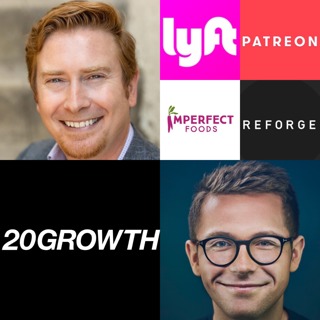
20 Growth: Viral Loops; How To Create and Sustain Them, Why Interviews for Product and Growth Hires are BS and What To Do Instead, Mastering the Onboarding Process; Structuring the First 90 Days with Adam Fishman, Former Head of Growth @ Lyft
Adam Fishman is one of the leading growth practitioners of the last decade. Most recently, Adam was the Chief Product and Growth Offer at Imperfect Foods, where Adam built a 40-person product and growth organization, responsible for 70% of overall company metrics and growing revenue by 400% in one year to $600M annually. Before Imperfect, Adam spent 4 years as VP of Product and Growth @ Patreon, driving the company pivot and rebrand and helping the company scale to $1BN GMV and $100M in revenue. Finally, before Patreon, Adam was the Head of Growth @ Lyft, Adam was the first growth and marketing employee hired, grew the team to 18 people, and reported directly to the founders. In Today's Episode with Adam You Will Learn: 1.) Entry into Growth: How Adam first made his way into the world of growth when "growth" did not exist as a function? What were Adam's biggest lessons from leading Lyft's growth team? How did that impact his mindset? What are some of Adam's biggest takeaways from his time at Patreon? What are some of the biggest mistakes he made at Patreon? 2.) The Basics: Growth 101: What and When: How does Adam define "growth" today? What is it? What is it not? When is the right time to hire your first growth hires? Should this first hire be a seasoned growth leader or a more junior growth rep? What characteristics and skill sets should this growth hire have? 3.) The Hiring Process: How should founders structure the hiring process for their first growth hire? What 3 questions should all founders ask in the hiring process for growth? How can founders use data and case studies to really test the skillsets of growth candidates? Why does Adam believe that the hiring process for growth and product is so broken? 4.) The Onboarding Process: What is the right way to structure the onboarding process for new growth hires? How should growth hires create cross-functional relationships and communication with the rest of the team? What has worked for Adam in the past? What has not? What are the signs that are new growth hire is not working? How long should they be given? What are the signs that are a new growth hire is working? What is the sign of "exceptional"? 5.) Adam Fishman: AMA: What growth decision has Adam made without data? How did it go? How does Adam define "viral loops"? What makes one better than another? Where do so many make mistakes with viral loops? Adam led the rebrand for Patreon, what is the secret to a successful rebrand? What are some of the most common pitfalls to avoid? Items Mentioned in Today's Episode with Adam Fishman Adam's Favourite Book: First 90 Days, Critical Success Strategies for New Leaders at All Levels
15 Kesä 202250min




















